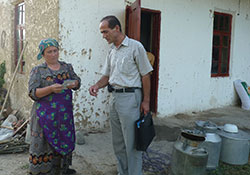Safe water in Tajikistan

WHO/Tahmina Alimamedova
Safe water for all: review of water safety project in Tajikistan
A mission to pilot districts of a water-safety project visited Tajikistan on 2–6 July 2012. The team, consisting of experts from the German Federal Environment Agency (Umweltbundesamt - UBA) and the WHO Country Office, Tajikistan, met representatives of the working group of facilitators in Panjakent and Hamadoni districts, observed activities related to water safety plans, visited rural communities and gave lectures to increase residents’ knowledge of waterborne diseases, hygiene, sanitation and health.
The experts also gave information, education and communication materials on hygiene and sanitation to the rural population, to establish a basic understanding of health issues associated with waterborne diseases.
Background
Despite recent investment to improve the water and sanitation infrastructure in Tajikistan, many low-income communities still lack access to safe drinking-water. Aside from poor initial water quality, factors that help to spread waterborne diseases and other risks include widespread unhygienic practices in collecting and storing water, poor hand washing and limited access to sanitation facilities.
To address this, the WHO Country Office, Tajikistan, in cooperation with the State Sanitary Epidemiological Surveillance Service, is implementing a water-safety project. It is part of a broader project called “Protecting health from climate change – a seven-country initiative” that is carried out by WHO/Europe and UBA and financed by the Ministry.
The recent mission to the pilot districts of Panjakent and Hamadoni was planned during a March 2012 seminar, led by experts from the Ministry and WHO/Europe, on water-supply systems and introducing water-safety plans in small-scale systems.



